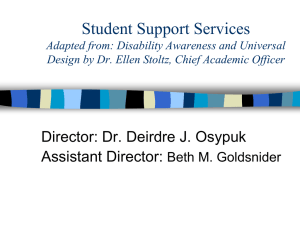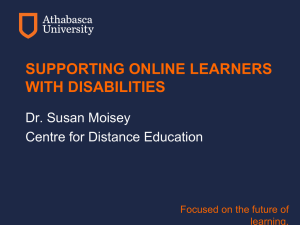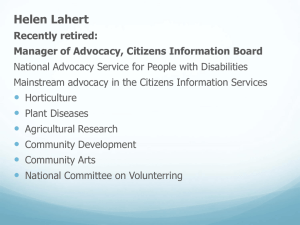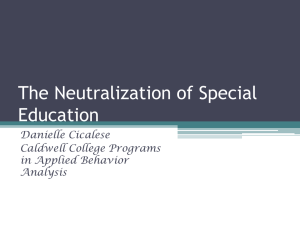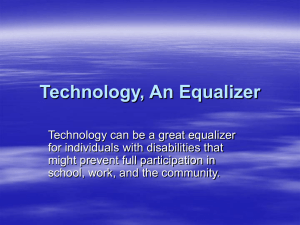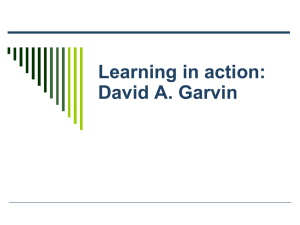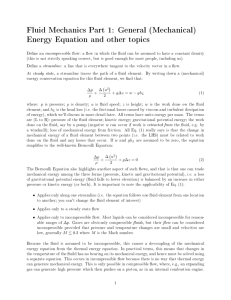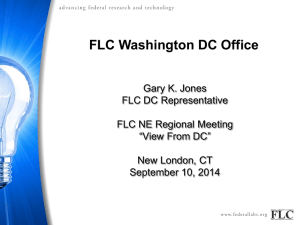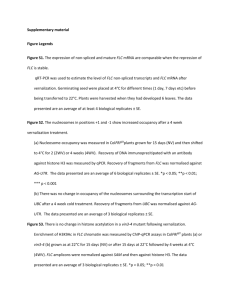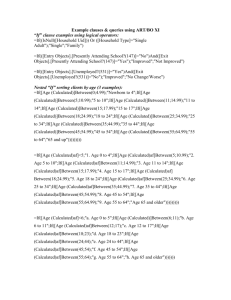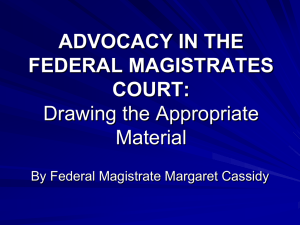Powerpoint template for scientific poster
advertisement
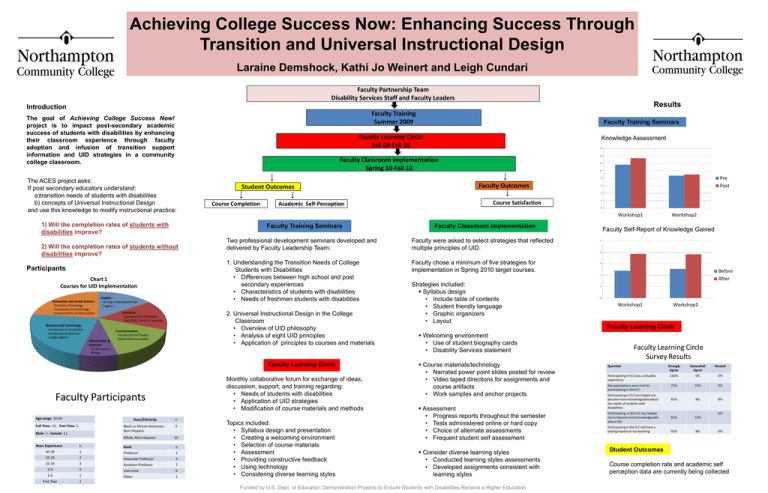
Achieving College Success Now: Enhancing Success Through Transition and Universal Instructional Design Laraine Demshock, Kathi Jo Weinert and Leigh Cundari Faculty Partnership Team Disability Services Staff and Faculty Leaders Results Introduction Faculty Training Summer 2009 The goal of Achieving College Success Now! project is to impact post-secondary academic success of students with disabilities by enhancing their classroom experience through faculty adoption and infusion of transition support information and UID strategies in a community college classroom. Faculty Learning Circle Fall 09-Fall 10 1) Will the completion rates of students with disabilities improve? Student Outcomes Chart 1 Courses for UID Implementation English: Writing II (Developmental) English II Education: Education for All Students Early Child. Devel. & Language Course Completion Academic Self-Perception Two professional development seminars developed and delivered by Faculty Leadership Team: Race/Ethnicity Monthly collaborative forum for exchange of ideas, discussion, support, and training regarding: • Needs of students with disabilities • Application of UID strategies • Modification of course materials and methods Full Time: 12; Part Time: 1 Male: 2; Female: 11 Years Experience n Black or African American, Non-Hispanic 3 White, Non-Hispanic 10 n Rank n 30-39 1 Professor 1 20-29 2 Associate Professor 4 10-19 3 Assistant Professor 7 5-9 5 Instructor 0 1-4 1 Other 1 First Year 1 10 Pre Post Faculty Outcomes 6 2 Course Satisfaction 0 Faculty Classroom Implementation Faculty were asked to select strategies that reflected multiple principles of UID. Workshop2 Faculty Self-Report of Knowledge Gained 5 4 Faculty Learning Circle Faculty Participants 12 Workshop1 2. Universal Instructional Design in the College Classroom • Overview of UID philosophy • Analysis of eight UID principles • Application of principles to courses and materials Communication: Introduction to Theater Speech Communication Age range: 30-64 14 4 1. Understanding the Transition Needs of College Students with Disabilities • Differences between high school and post secondary experiences • Characteristics of students with disabilities • Needs of freshmen students with disabilities Participants Allied Health & Sciences: Contemporary Biology 16 8 Faculty Training Seminars 2) Will the completion rates of students without disabilities improve? Business and Technology: Introduction to Computers Introduction to Business College Algebra Knowledge Assessment Faculty Classroom Implementation Spring 10-Fall 10 The ACES project asks: If post secondary educators understand: a)transition needs of students with disabilities b) concepts of Universal Instructional Design and use this knowledge to modify instructional practice: Humanities and Social Science: Principles of Sociology Introduction to Psychology Introduction to Criminal Justice Faculty Training Seminars Topics included: • Syllabus design and presentation • Creating a welcoming environment • Selection of course materials • Assessment • Providing constructive feedback • Using technology • Considering diverse learning styles Faculty chose a minimum of five strategies for implementation in Spring 2010 target courses. 3 Before After 2 Strategies included: Syllabus design • Include table of contents • Student friendly language • Graphic organizers • Layout 1 0 Workshop1 Faculty Learning Circle Welcoming environment • Use of student biography cards • Disability Services statement Course materials/technology • Narrated power point slides posted for review • Video taped directions for assignments and course artifacts • Work samples and anchor projects Assessment • Progress reports throughout the semester • Tests administered online or hard copy • Choice of alternate assessments • Frequent student self assessment Consider diverse learning styles • Conducted learning styles assessments • Developed assignments consistent with learning styles Funded by U.S. Dept. of Education Demonstration Projects to Ensure Students with Disabilities Receive a Higher Education Workshop2 Faculty Learning Circle Survey Results Question Strongly Agree Somewhat Agree Neutral Participating in FLC was a valuable experience 100% 0% 0% My expectations were met for participating in the FLC 75% 25% 0% 85% 8% 8% Participating in FLC has helped me become more knowledgeable about the needs of students with disabilities Participating in the FLC has helped me to become more knowledgeable about UID Participating in the FLC will have a lasting impact on my teaching 0% 85% 15% 92% 8% 0% Student Outcomes Course completion rate and academic self perception data are currently being collected
